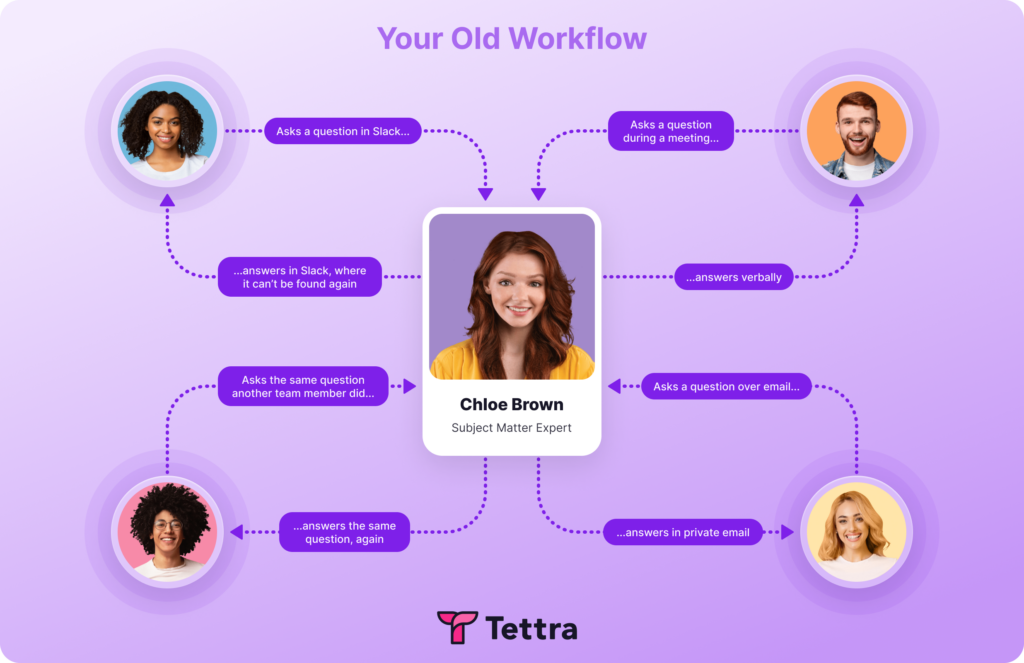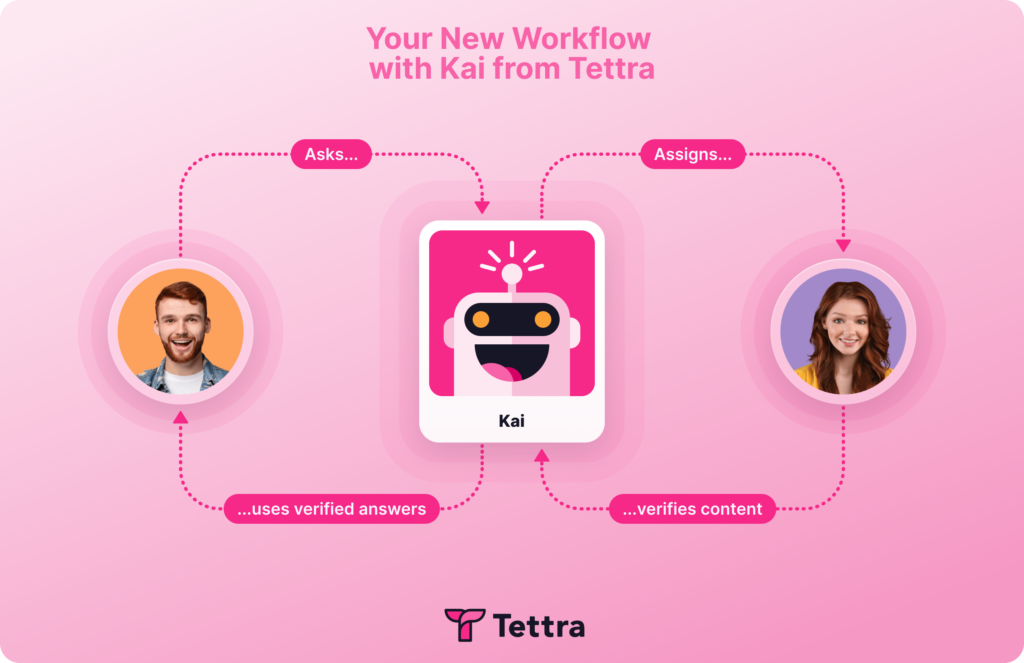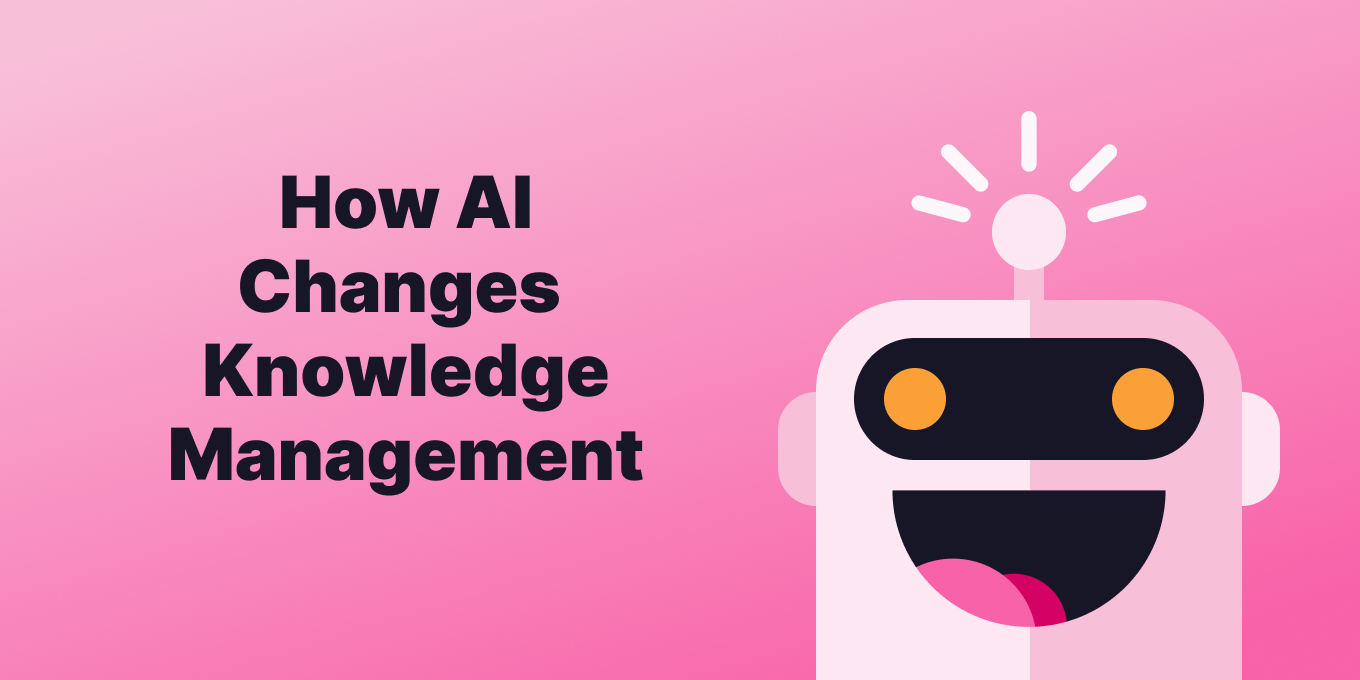There’s no doubt that knowledge workers will find themselves working more and more with AI over the coming years.
And while there are a thousand ways (and tools) for your business to use this new technology, one of the best places to implement it is in how your company manages knowledge. Currently, knowledge managers — the people who are responsible for maintaining information docs and answering team member questions — are overworked, often with requests to answer the same question again and again or direct a teammate to already-documented information.
That’s why Tettra’s approach to artificial intelligence is specifically designed to assist knowledge managers in their role, streamlining the flow of knowledge to increase efficiency while decreasing costs and team member frustration.
Your Old Knowledge Management Workflow

Managing company knowledge has always been a difficult problem.
Tenured employees hold institutional knowledge that is seldom chronicled in knowledge bases. Then that knowledge sharing is lost when the employees walk out the door. Their information is spread across Google, Notion, Word, and other documents siloes information from those who need it.
This has been a long-standing issue for scaling companies that need to move quickly and make information readily available, creating problems such as:
- Having to hire a full-time knowledge manager. Without functioning processes, many companies brought on a full-time employee to manage the knowledge base, wasting valuable resources trying to fix an ineffective system.
- Unusable knowledge bases. With the knowledge base being cluttered and hard to search, team members would hesitate to use it or ignore it entirely. Not only did this force them to return to previous, inefficient methods of obtaining knowledge (below), but it wasted all the resources the company committed to the knowledge management software.
- Returning to the inefficient way of working used before the knowledge base. Unable to find what they were looking for, employees go back to asking questions over Slack, shoulder-tapped subject matter experts, or wasting countless hours trying to find the person who could give them the right answer.
- Knowledge manager burnout. This resulted in the same employees answering the same repetitive questions over and over, leading to burnout, wasted time and money, and an overall decrease in performance.
The Other Way: Generative AI
Now, solving the problem of inefficient knowledge management is much easier thanks to the recent breakthroughs in artificial intelligence technology.
Many knowledge bases have decided to put their AI efforts into assisting their users with generative AI (or gen AI). Really, this is content creation.
With generative AI capabilities, they’re having the AI proofread and edit their help docs, battle cards, and other crucial company information. And while this capability undoubtedly helps users avoid typos and grammatical errors, it fails to harness the full potential of this new technology.
Other companies have taken a different approach, integrating their knowledge management systems with Chat GPT to bring the ideas generated text by AI straight into their user’s face. And while this method provides AI power when users are creating content, it too fails to maximize AI’s potential to solve many of the longstanding problems facing knowledge managers.
Your New AI Knowledge Management Workflow with Kai and Tettra

While there are many ways knowledge management systems employ AI, Tettra is using it to solve the problems that have long plagued companies trying to effectively manage their knowledge.
Instead of dealing with outdated wiki pages that your team never knows if they can trust, Tettra’s AI-powered knowledge management system utilizes a purpose-built workflow to capture critical company knowledge and ensure it is always up-to-date and discoverable. Here’s how it works.
- Ask — When a team member has a question, they search in Tettra. Kai, Tettra’s friendly AI assistant, scours existing company documents to find the answer they need, deflecting the question away from the subject matter expert. With the information easily discovered, the team member is able to complete their task and continue working without disruption.
- Assign — If Kai can’t find the answer, or the answer doesn’t exist, it will assist the searcher in creating it as a question in Tettra’s intuitive Q&A system where it will be assigned to the proper subject matter expert to answer. And with notifications and reminders, Tettra ensures that questions are never left unanswered.
- Verify — After a question is assigned to them, the subject matter expert can answer that question once and only once. Now, when another team member asks the question again, Kai will use its AI-powered search to pull out the verified answer. Not only does this ensure your team is using accurate information, but it saves the subject matter expert from having to answer the same question over and over again.
- Use — With a knowledge base full of verified, discoverable information, your team will be able to use Tettra’s AI-powered knowledge management system to easily find answers, meaning knowledge managers will only have to answer a question once, and only once.
With a purpose-built, AI-powered workflow, Tettra empowers knowledge managers to capture, chronicle, and distribute information to their team with maximal efficiency.
What are some of the other ways AI could impact knowledge management?
Here are some of the ways AI impacts and could further impact knowledge management. Tettra is reviewing and adding the AI capabilities that make the most sense for our current users and product roadmap.
- Automated Content Curation: AI can automate the process of gathering and organizing information. This includes sorting through large amounts of data to identify relevant content, tagging and categorizing information, and updating knowledge bases with new insights. Tettra already utilizes AI to generate FAQs and to tag relevant pages.
- Enhanced Search Functionality: AI improves search functions within knowledge management systems, making it easier to find relevant information quickly. This can include natural language processing (NLP) capabilities, allowing users to find information using conversational language.
- Predictive Analytics: AI can analyze patterns in how information is accessed and used, helping to predict future knowledge needs. This enables organizations to proactively create or acquire content that will be valuable in the future.
- Personalized User Experiences: AI can tailor knowledge management systems to individual users, suggesting relevant content based on their roles, past behavior, or specific queries. This personalization improves efficiency and user engagement.
- Content Gap Analysis: AI can identify gaps in existing knowledge bases by analyzing queries that return no results or poor-quality results, prompting the creation of new content that addresses these gaps.
- Automated Question Answering: AI-powered chatbots or virtual assistants can provide instant responses to common queries, reducing the need for manual search and improving efficiency.
- Knowledge Extraction from Unstructured Data: AI tools can extract valuable information from unstructured data sources like emails, documents, and social media posts, converting them into structured knowledge.
- Continuous Learning and Updating: AI systems can continually learn from new data, ensuring that the knowledge base remains current and accurate over time.
- Collaboration Enhancement: AI can facilitate better collaboration by connecting people with similar knowledge needs or expertise, and by suggesting relevant documents or experts based on the context of the work being done.
- Knowledge Visualization: AI can create visual representations of complex data, making it easier to understand relationships and patterns within the knowledge base.
- Semantic Analysis and Tagging: AI can perform deep semantic analysis of texts, enabling more precise and context-aware tagging of content, which improves the relevancy and accuracy of information retrieval.
- Ethical and Compliance Monitoring: AI can help in monitoring the knowledge management processes for compliance with ethical standards and regulatory requirements, flagging potential issues for review.
What are the benefits of using AI in knowledge management?
- Enhanced Efficiency and Productivity: Automating routine tasks and offering quick access to relevant information reduces time spent searching for data, thereby increasing overall productivity.
- Improved Information Retrieval: AI-powered search engines and NLP enable more accurate and context-aware retrieval of information, even with natural language queries.
- Data-Driven Insights: AI can analyze large datasets to uncover trends, patterns, and insights that might be missed by human analysis.
- Personalization: AI can tailor information and recommendations to individual users’ needs and preferences, enhancing user experience and relevance.
- Content Curation and Organization: AI can help in organizing and categorizing vast amounts of information, making it easier to navigate and manage.
- Gap Identification in Knowledge Bases: AI tools can identify areas where information is lacking or outdated, prompting timely updates and additions.
- Scalability: AI systems can handle increasing volumes of data efficiently, allowing knowledge bases to scale without a proportional increase in management complexity.
- Automated Question Answering and Assistance: Chatbots and virtual assistants can provide immediate responses to common queries, reducing the workload on human staff.
- Real-Time Updates and Learning: AI systems can continuously learn from new inputs, ensuring the knowledge base remains up-to-date and evolves with changing information.
- Error Reduction: AI can help in reducing human errors in data entry and information processing.
- Predictive Analysis: AI can forecast future trends and needs based on current data, aiding in strategic planning and decision-making.
- Enhanced Collaboration: AI can suggest relevant documents or experts, fostering better collaboration within an organization.
- Compliance and Ethical Monitoring: AI can monitor knowledge management practices for compliance with regulations and ethical standards.
How can AI knowledge management help with customer service and support?
Integrating AI with Tettra, a knowledge management system, can significantly enhance customer service in several ways:
- Instant Access to Information: AI enables quick retrieval of relevant information from the knowledge base. Customer service representatives can rapidly find answers to customer inquiries, leading to faster and more accurate responses.
- Automated Responses: AI-powered chatbots or virtual assistants can provide immediate answers to common customer queries, reducing the workload on human agents and ensuring customers receive instant support.
- Personalized Customer Interactions: AI can analyze customer data to offer personalized assistance. This means customers receive information and solutions tailored to their specific needs and history.
- Reduced Training Time: With AI-powered knowledge management, new customer service agents can be trained more quickly and efficiently, as they have immediate access to a comprehensive and easily navigable knowledge base.
- Consistency in Responses: AI ensures that the information provided to customers is consistent across all service channels, maintaining a uniform standard of service.
➡️ Many of Tettra’s best users are customer support and service teams. Schedule your free demo to see how Tettra can unlock new knowledge workflows for your team.
By using AI advancements to help your team members quickly find information and direct outstanding questions, as well as relieving your subject matter experts from the burden of having to answer repetitive questions in Slack, Kai, Tettra’s friendly AI assistant, is the optimal method of AI-powered knowledge management.
Ready to revamp your knowledge base? Start your free trial or book your demo.


